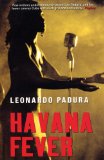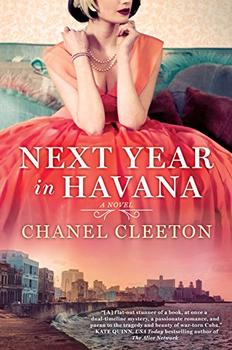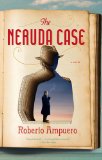Summary | Excerpt | Reviews | Beyond the book | Read-Alikes | Genres & Themes | Author Bio

Mario Conde, retired from the police force, now makes a living trading antique books. In a book, Conde discovers a newspaper article about a beautiful bolero singer of the 1950’s, who disappeared mysteriously. Conde’s intuition sets him off on an investigation into the murder.
Havana, 2003, fourteen years since Mario Conde retired from the police force and much has changed in Cuba. He now makes a living trading in antique books bought from families selling off their libraries in order to survive. In the house of Alcides de Montes de Oca, a rich Cuban who fled after the fall of Batista, Conde discovers an extraordinary book collection and, buried therein, a newspaper article about Violeta del Rio, a beautiful bolero singer of the 1950’s, who disappeared mysteriously. Conde’s intuition sets him off on an investigation that leads him into a darker Cuba, now flooded with dollars, populated by pimps, prostitutes, drug dealers and other hunters of the night. But this novel also allows Padura to evoke the Havana of Batista, the city of a hundred night clubs where Marlon Brando and Josephine Baker listened to boleros, mambos and jazz. Probably Padura’s best book, Havana Fever is many things: a suspenseful crime novel, a cruel family saga and an ode to literature and his beloved, ravaged island.
Purely as a mystery novel, Havana Fever is top-notch and a terrific example of modern noir.
The real highlight of the book, though, is Padura's rich and evocative writing style. He brilliantly conjures up both the smoky nightclubs of Batista's Havana in the 1950s and the city's present poverty, comparing and contrasting the two different eras. Both are dark, gritty and rife with corruption. The modern scenes in particular are cloaked in an oppressive, unrelenting gloom that doesn't begin to lift until the book's final pages. The writing is almost poetic at times...continued
Full Review
 (756 words)
(756 words)
(Reviewed by Kim Kovacs).
The Cuban bolero is the first internationally recognized music form to originate in Cuba. Closely related to trovador songs and habaneras, boleros are songs of romance, featuring themes of love and heartbreak. The music is most often slow, sensual and deeply romantic.
The Cuban bolero
is often confused with the Spanish bolero. The two forms arose independently,
apparently neither influencing the other. Whereas the Spanish bolero is always in 3/4 time, the Cuban version is in 2/4 or 4/4. In addition, the Cuban version is heavily influenced by African-based rhythms. The two styles are danced differently, as well; the Spanish bolero has couples dancing apart, while the Cuban bolero is danced by couples who are touching.
It is ...

If you liked Havana Fever, try these:

by Chanel Cleeton
Published 2018
After the death of her beloved grandmother, a Cuban-American woman travels to Havana, where she discovers the roots of her identity--and unearths a family secret hidden since the revolution...

by Roberto Ampuero
Published 2013
Evocative, romantic, and full of intrigue,The Neruda Case is both a glimpse into the life of Pablo Neruda as death approaches and a political thriller that unfolds during the fiercely convulsive end of an era.
Wisdom is the reward you get for a lifetime of listening when you'd rather have been talking
Click Here to find out who said this, as well as discovering other famous literary quotes!